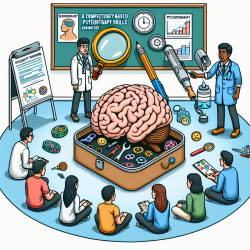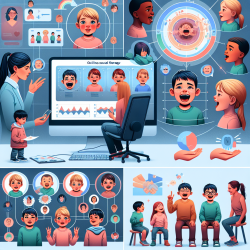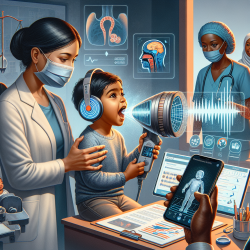Introduction
In the realm of speech-language pathology, understanding the genetic underpinnings of disorders can significantly enhance therapeutic approaches and outcomes. A recent study titled "ADGRL3 (LPHN3) variants predict substance use disorder" sheds light on the genetic factors contributing to substance use disorder (SUD) in individuals with attention-deficit/hyperactivity disorder (ADHD). This blog explores the study's findings and discusses how practitioners can leverage this knowledge to improve clinical outcomes.
The Role of ADGRL3 Variants
ADGRL3, also known as LPHN3, is a gene that has been linked to ADHD and is now identified as a predictor of SUD. The study utilized a comprehensive approach, analyzing data from 2,698 participants across various global regions. The researchers employed recursive-partitioning frameworks, integrating clinical, demographic, and genetic data to predict SUD susceptibility in ADHD patients.
Key Findings
- Genetic Association: Variants in the ADGRL3 gene were found to be significant predictors of SUD in individuals with ADHD.
- Predictive Models: The study developed robust predictive models that can efficiently forecast SUD in ADHD patients, utilizing genetic markers such as rs4860437.
- Clinical Implications: These findings offer a novel methodological approach for clinicians to assess and predict the risk of SUD in patients with ADHD, potentially guiding more personalized treatment plans.
Implications for Practitioners
For speech-language pathologists and other practitioners working with children, understanding the genetic predispositions that contribute to SUD can be transformative. By integrating genetic testing and predictive modeling into their assessment protocols, practitioners can:
- Identify children at higher risk for SUD early in their development.
- Tailor interventions to address both ADHD and potential SUD comorbidities.
- Collaborate with genetic counselors and other healthcare professionals to provide comprehensive care.
Encouraging Further Research
While the study provides significant insights, it also highlights the need for further research to explore the intricate interactions between genetic variants and environmental factors. Practitioners are encouraged to stay informed about ongoing research and consider participating in studies that can contribute to a deeper understanding of these complex disorders.
Conclusion
The identification of ADGRL3 variants as predictors of SUD in ADHD patients opens new avenues for clinical practice and research. By incorporating genetic insights into therapeutic strategies, practitioners can enhance their ability to create positive outcomes for children. To delve deeper into the research, you can read the original paper: ADGRL3 (LPHN3) variants predict substance use disorder.










